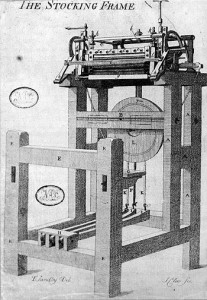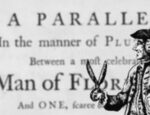Description
 Read ‘To Antiquity’ by Robert Millhouse (1788-1939), known as ‘the artisan poet’ of Nottingham. Working in a factory by the age of six, and at a stocking loom by the age of ten, he struggled to educate himself by reading Shakespeare, Milton, Gray, Collins, Pope’s Homer and Dryden’s Aeneid. He joined the Nottingham militia for a few years. But when the regiment was disbanded he was compelled to return to weaving, eventually securing a low-paying job in a savings bank.
Read ‘To Antiquity’ by Robert Millhouse (1788-1939), known as ‘the artisan poet’ of Nottingham. Working in a factory by the age of six, and at a stocking loom by the age of ten, he struggled to educate himself by reading Shakespeare, Milton, Gray, Collins, Pope’s Homer and Dryden’s Aeneid. He joined the Nottingham militia for a few years. But when the regiment was disbanded he was compelled to return to weaving, eventually securing a low-paying job in a savings bank.
 He struggled with poverty for all his fifty years, having seven children by two successive wives. His 1839 obituary in The Literary World records that in 1828 he participated in a strike of the frame-work-knitters in Nottingham. According to his wealthy patron Sir Richard Phillips, he suffered ‘for his fidelity to his brethren, every kind of privation. He justified this strike, and displayed, with great energy and eloquence, the wretched situation of himself and others’. Yet Millhouse still produced several volumes of poetry well commended in his own time. He felt his disadvantaged background keenly, believing it to have prevented him from fully developing his innate talent for poetry.
He struggled with poverty for all his fifty years, having seven children by two successive wives. His 1839 obituary in The Literary World records that in 1828 he participated in a strike of the frame-work-knitters in Nottingham. According to his wealthy patron Sir Richard Phillips, he suffered ‘for his fidelity to his brethren, every kind of privation. He justified this strike, and displayed, with great energy and eloquence, the wretched situation of himself and others’. Yet Millhouse still produced several volumes of poetry well commended in his own time. He felt his disadvantaged background keenly, believing it to have prevented him from fully developing his innate talent for poetry.
In ‘To Antiquity’, one of the sonnets in his collection Blossoms (1823), he uses the idea of the classical past to consider how death the leveller erases all social and economic distinctions. The wasteland of the antique past covers alike the bodies of king and peasant, philosopher and poet, rich man and impoverished, labouring wretch. Flowers can bloom on the soil which covers the grave of a slave as well as the grave of Caesar himself. Sadly, Millhouse’s own grave in Nottingham Cemetery, with its ornament of lyre and laurel wreath, itself became sorely overgrown.
The solitary waste of former days!
Gone are all they who sojourn’d on thy plain—
The imperial Monarch and the simple Swain;
Philosophers, and Bards of heaven-wrought lays—
With them, near some base Miser, lies reclin’d
A wretch now freed from sorrow and despair,
Who ceaseless strove in wain, by toilsome care
To cast grim Penury and Want behind.—
The Good, the Vile, the Coward, and the Brave.
The Foolish and the Wise, in common rest—
And if a floret spring on Caesar’s breast,
That flower would bloom as sweetly o’er a Slave.—
Nor Great, nor Small shall pass the deathful gloom,
Till the last Trumpet summon to the Doom.







